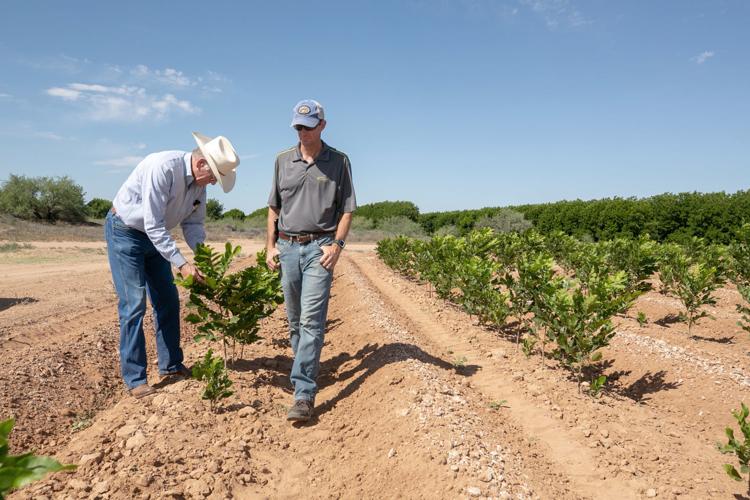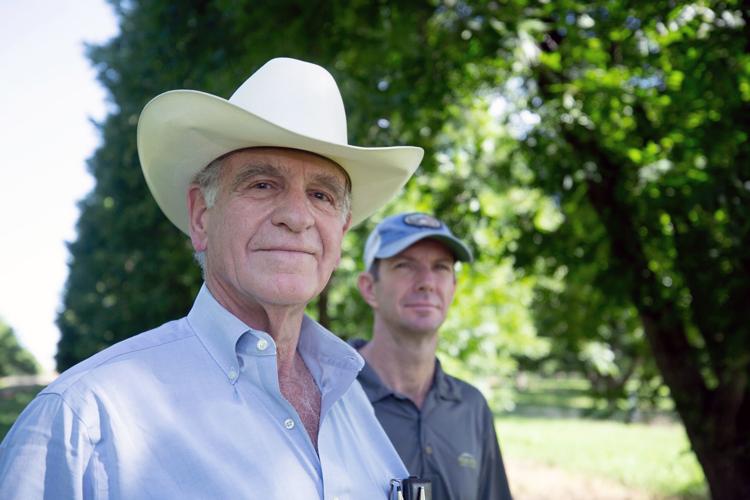Arizona had a record crop of pecans in 2017, as acreage added in the past several years began to boost production of the nut.
But the trade war developing over tariffs imposed by the Trump administration has raised fears that retaliatory tariffs by China and other major trading partners could significantly cut pecan demand and prices.
Arizona’s utilized pecan production last year was a record 28 million pounds, up 13 percent from 2016, according to the U.S. Department of Agriculture’s National Agriculture Statistics Service.
The value of Arizona’s pecan crop rose 4 percent to $70 million, though the average price per pound fell 21 cents, to $2.50 per pound of in-shell nuts.
Arizona ranks fourth among the states in pecan production, behind Georgia, New Mexico and Texas.
New Mexico produced a record 92 million pounds of pecans last year, a 28 percent increase from 2016, while Georgia saw its pecan production drop about 2 percent last year, to 107 million pounds.
Growers including major producer Sahuarita-based Farmers Investment Corp., or FICO, started adding acreage several years ago, mainly in Cochise County. Arizona’s pecan orchards are concentrated in the southeastern part of the state, where higher elevations make for ideal growing conditions.
Last year, there were an estimated 26,000 acres of pecans planted in Arizona, including about 15,000 with nut-producing trees, said Joshua Sherman, commercial horticulture area agent with the University of Arizona Cooperative Extension.
Though the U.S. Department of Agriculture does not closely monitor pecan acreage, as it does with annual crops like cotton, estimates based on surveys of growers indicate the industry has been adding 2,000 to 2,500 acres of pecans each year for the past several years, Sherman said.
In the past decade or so, growers responded to increased global demand for pecans by buying up property for new groves, which take five to six years to start producing nuts and 10 to 12 years to reach full production.
“In the last five or six years, it’s really caught on,” FICO President Dick Walden said of the added acreage.
FICO, which also does business as Green Valley Pecan Co., started adding acreage in the San Simon area of Cochise County in 2005 and now farms 3,600 acres there, along with some 4,500 acres in the Sahuarita area and about 1,000 acres of orchards in Georgia.
Walden said his company has taken advantage of new pruning equipment technologies to grow trees that are more compact, allowing more trees to be planted where older trees were removed to thin high-density orchards planted in the past.
Though production is up, Walden and other pecan growers and processors are concerned that a tariff battle with China and Europe could significantly cut demand and depress prices, as foreign trading partners respond to U.S. tariffs on steel, aluminum and other products imposed by the Trump administration.
In April, China slapped an additional tariff of 15 percent on a range of agricultural products including pecans, bringing the total tariff on pecans to 22 percent.
“I’m greatly concerned about the tariffs,” said Walden, noting that FICO exports about 60 percent of its production, and China has been importing an estimated 15 to 18 percent of the annual U.S. pecan crop.
The European Union has announced new retaliatory tariffs on a range of consumer goods that will go into effect in July, but pecans and other tree nuts are not included.
“Our foreign customers are very nervous. They are asking us to accelerate shipments to Europe, anticipating there might be a tariff put in place by the EU in reaction to the tariffs placed on the EU by the United States,” Walden said. “This saber-rattling by the president might have significant negative impact on our business.”
The effects of the tariffs on pecan producers may be delayed, since crops are typically sold under contract ahead of the harvest.
Pecan producers are hopeful that China’s strong appetite for pecans will help keep exports at healthy levels.
China is the world’s biggest producer of walnuts but produces none of its own pecans, which are native to North America.
“I’m not an economist, but I think we can be optimistic because there’s such a high demand in China,” Sherman said.






